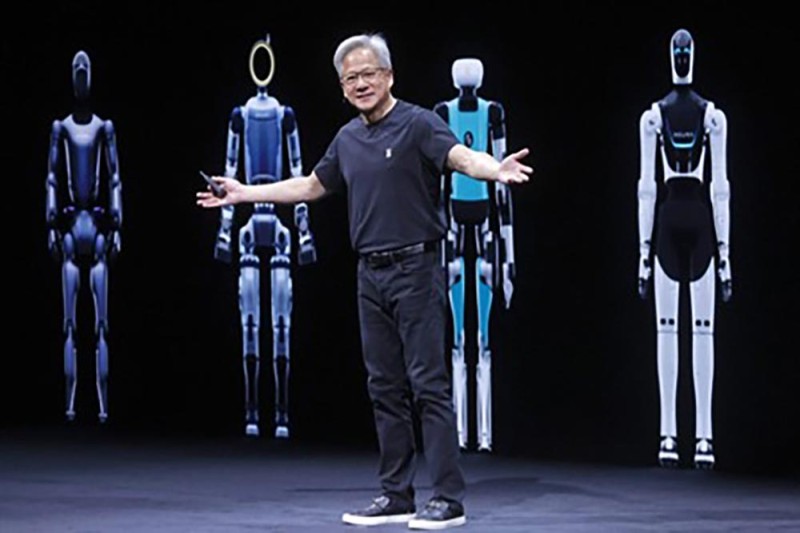
英伟达(Nvidia)首席执行官黄仁勋(Jensen Huang)预测,人工智能不仅将与人类协作,还将经历招聘和入职培训流程,以融入企业文化。
这位62岁的亿万富翁联合创始人上周接受Citadel Securities采访时估计,随着数字护士、会计师、律师以及营销人员加入劳动力队伍,代理式人工智能劳动力的潜在市场规模可达数万亿美元。
黄仁勋补充道:“根据质量和专业深度,企业既可授权使用部分代理式人工智能,也可直接雇佣代理式人工智能,这不足为奇。未来企业劳动力将由人类与数字人类共同构成。”
这些人工智能工作者可能依托各类平台运行,这位芯片行业领袖提到了OpenAI、Harvey、OpenEvidence、Cursor、Replit和Lovable等平台。
其他AI智能体可能是公司自主开发的。黄仁勋透露,英伟达已自主研发AI智能体,以保护专有知识和数据。事实上,他补充道,公司网络安全AI智能体的数量已远超从事网络安全工作的人类员工。
在后续交流中,黄仁勋阐述了入职培训在英伟达的重要意义——必须向新员工灌输企业文化、理念和实践。数字人类的入职流程亦将如此。
他说道:“我告诉首席信息官,未来信息技术部门将成为代理式人工智能的人力资源部门。他们要承担起为未来数字员工提供人力管理服务的职责。这些数字员工将与人类员工协作,这将是公司未来的形态。”
其他科技领袖也设想了类似的场景——人类和代理式人工智能员工协作。
在瑞士达沃斯举行的世界经济论坛上,赛富时(Salesforce)首席执行官马克·贝尼奥夫(Marc Benioff)表示,他和许多其他首席执行官将成为最后一批管理纯人类团队的高管。
他表示:“从现在开始……我们不仅将管理人类员工,还将管理数字员工。”
在同一场活动中,Anthropic首席执行官达里奥·阿莫迪(Dario Amodei)表示,到2026或2027年,人工智能系统将在“几乎所有领域超越绝大多数人类”。
诚然,此类预测也引发了人们对人类如何适应人工智能驱动的新型劳动力市场的担忧。
越来越多证据表明,由于企业日益依赖人工智能,近期大学毕业生求职难度正持续攀升。阿莫迪今年甚至发出警示,人工智能可能会淘汰约50%的初级白领岗位。
毕马威(KPMG)6月发布的《人工智能季度脉搏调查》显示,自去年第四季度以来,企业AI智能体的部署量增加了两倍。
该调查还发现,82%的企业领导者认为AI智能体将在未来一年内成为宝贵助力,同等比例的领导者认为这些智能体将在未来两年内彻底重塑商业格局。
此外,87%的企业领导者认为AI智能体将促使企业重新定义绩效考核标准,并提升可能被人工智能取代岗位的员工的技能水平。
毕马威生态系统主管托德·洛尔(Todd Lohr)表示:“这不仅关乎技术采用,还关乎根本性的商业变革,需要重新构想工作方式及其衡量标准。”(*)
译者:中慧言-王芳
英伟达(Nvidia)首席执行官黄仁勋(Jensen Huang)预测,人工智能不仅将与人类协作,还将经历招聘和入职培训流程,以融入企业文化。
这位62岁的亿万富翁联合创始人上周接受Citadel Securities采访时估计,随着数字护士、会计师、律师以及营销人员加入劳动力队伍,代理式人工智能劳动力的潜在市场规模可达数万亿美元。
黄仁勋补充道:“根据质量和专业深度,企业既可授权使用部分代理式人工智能,也可直接雇佣代理式人工智能,这不足为奇。未来企业劳动力将由人类与数字人类共同构成。”
这些人工智能工作者可能依托各类平台运行,这位芯片行业领袖提到了OpenAI、Harvey、OpenEvidence、Cursor、Replit和Lovable等平台。
其他AI智能体可能是公司自主开发的。黄仁勋透露,英伟达已自主研发AI智能体,以保护专有知识和数据。事实上,他补充道,公司网络安全AI智能体的数量已远超从事网络安全工作的人类员工。
在后续交流中,黄仁勋阐述了入职培训在英伟达的重要意义——必须向新员工灌输企业文化、理念和实践。数字人类的入职流程亦将如此。
他说道:“我告诉首席信息官,未来信息技术部门将成为代理式人工智能的人力资源部门。他们要承担起为未来数字员工提供人力管理服务的职责。这些数字员工将与人类员工协作,这将是公司未来的形态。”
其他科技领袖也设想了类似的场景——人类和代理式人工智能员工协作。
在瑞士达沃斯举行的世界经济论坛上,赛富时(Salesforce)首席执行官马克·贝尼奥夫(Marc Benioff)表示,他和许多其他首席执行官将成为最后一批管理纯人类团队的高管。
他表示:“从现在开始……我们不仅将管理人类员工,还将管理数字员工。”
在同一场活动中,Anthropic首席执行官达里奥·阿莫迪(Dario Amodei)表示,到2026或2027年,人工智能系统将在“几乎所有领域超越绝大多数人类”。
诚然,此类预测也引发了人们对人类如何适应人工智能驱动的新型劳动力市场的担忧。
越来越多证据表明,由于企业日益依赖人工智能,近期大学毕业生求职难度正持续攀升。阿莫迪今年甚至发出警示,人工智能可能会淘汰约50%的初级白领岗位。
毕马威(KPMG)6月发布的《人工智能季度脉搏调查》显示,自去年第四季度以来,企业AI智能体的部署量增加了两倍。
该调查还发现,82%的企业领导者认为AI智能体将在未来一年内成为宝贵助力,同等比例的领导者认为这些智能体将在未来两年内彻底重塑商业格局。
此外,87%的企业领导者认为AI智能体将促使企业重新定义绩效考核标准,并提升可能被人工智能取代岗位的员工的技能水平。
毕马威生态系统主管托德·洛尔(Todd Lohr)表示:“这不仅关乎技术采用,还关乎根本性的商业变革,需要重新构想工作方式及其衡量标准。”(*)
译者:中慧言-王芳
Nvidia CEO Jensen Huang predicts AI will not only work alongside people, but also go through a hiring and orientation process to absorb a company’s culture.
In an interview with Citadel Securities last week, the 62-year-old billionaire cofounder of Nvidia estimated the potential market for agentic AI labor could be trillions of dollars, as digital nurses, accountants, lawyers, and marketers join the workforce.
“I wouldn’t be surprised if you license some and you hire some, depending on the quality and depending on the deep expertise,” Huang added. “So future workforces in enterprise will be a combination of humans and digital humans.”
Those AI workers could also be based on a range of platforms, with the chip boss name-checking the likes of OpenAI, Harvey, OpenEvidence, Cursor, Replit, and Lovable.
Other AI agents may be homegrown. Nvidia has developed its own to safeguard proprietary knowledge and data, Huang said. In fact, the company already has a lot more cybersecurity AI agents than people working on cybersecurity, he added.
Later in the conversation, Huang explained how critical the onboarding process is at Nvidia, which needs to impart its culture, philosophies, and practices to new hires. Digital humans will be no different.
“I tell my CIO, our company’s IT department, they’re going to be the HR department of agentic AI in the future,” he said. “They’re going to be the HR department of digital employees of the future. And those digital employees are going to work with our biological ones, and that’s going to be the shape of our company in the future.”
Other tech leaders envision a similar scenario of humans and agentic AI employees working together.
At this year’s World Economic Forum in Davos, Switzerland, Salesforce’s Marc Benioff said he and many of his fellow CEOs would be the last cohort of executives to lead all-human workforces.
“From this point forward … we will be managing not only human workers but also digital workers,” he said.
Also at that event, Anthropic CEO Dario Amodei said that by 2026 or 2027, AI systems will be “better than almost all humans at almost all things.”
Of course, such predictions have also generated anxiety about how humans will fit into the new AI-powered labor market.
Evidence has been mounting that recent college graduates are having a harder time finding jobs because companies are relying more on AI. Amodei even warned this year that AI could wipe out roughly 50% of all entry-level white-collar jobs.
The deployment of AI agents across organizations has tripled since the fourth quarter of last year, according to KPMG’s AI Quarterly Pulse Survey from June.
It also found that 82% of business leaders believe AI agents will become valuable contributors within the next year, and the same number believe these agents will completely change the business landscape in the next two years.
In addition, 87% of business leaders believe AI agents will force organizations to redefine performance metrics and upskill their employees in roles that AI could displace.
“This isn’t just about technology adoption,” said Todd Lohr, head of ecosystems at KPMG. “It’s about fundamental business transformation that requires reimagining how work gets done and how it is measured.”

